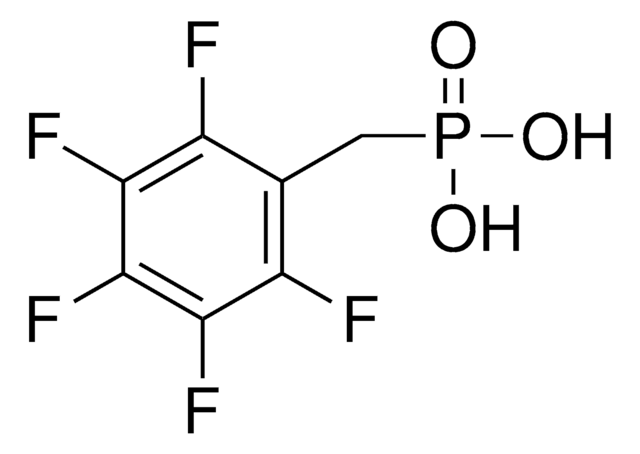All Photos(1)
About This Item
Empirical Formula (Hill Notation):
C66O6NH7
Molecular Weight:
909.76
UNSPSC Code:
12352103
NACRES:
NA.23
Recommended Products
General description
C60 Pyrrolidine tris-acid (CPTA) is a fullerene derivative that has carboxyl functionalized carbon buckyballs. It is majorly used in electrochemical devices as an electron transporting layer (ETL) due to its high energy level and electron mobility. It can be used as an alternative to conventional metal oxide based charge carrying films, through the esterification of a carboxylic acid with hydroxyl groups. Its solubility in water and other polar solvents makes it useful in solution processed devices.
This is a high value compound - minimal loss. It is water soluble fullerene, hence suitable for biological applications. Water-soluble fullerene adduct. Mono-adduct solubility at pH ~13 is about 0.5 mg/ml, giving stable solutions with aggregates in the 20 - 200 nm range. At pH 7.4, solubility is about 0.002 - 0.005 mg/ml.
Application
C60 Pyrrolidine tris-acid may be used as a cathode buffer layer in solar cells. It may be used as a wetting layer in an organic photovoltaics.
CPTA can be used as a cathodic buffer that forms a conductive layer between the active layer and the electrode layer for the fabrication of polymeric solar cells and perovskite based solar cells.
Signal Word
Warning
Hazard Statements
Precautionary Statements
Hazard Classifications
Eye Irrit. 2 - Skin Irrit. 2 - STOT SE 3
Target Organs
Respiratory system
Storage Class Code
11 - Combustible Solids
WGK
WGK 3
Personal Protective Equipment
dust mask type N95 (US), Eyeshields, Gloves
Certificates of Analysis (COA)
Search for Certificates of Analysis (COA) by entering the products Lot/Batch Number. Lot and Batch Numbers can be found on a product’s label following the words ‘Lot’ or ‘Batch’.
Already Own This Product?
Find documentation for the products that you have recently purchased in the Document Library.
Customers Also Viewed
Electron-Transport-Layer-Assisted Crystallization of Perovskite Films for High-Efficiency Planar Heterojunction Solar Cells
Wang Y, et al.
Advances in Functional Materials, 28(9), 1706317-1706317 (2018)
High performance polymer solar cells with a polar fullerene derivative as the cathode buffer layer.
Li X, et al.
Journal of Material Chemistry A, 1(40), 12413-12416 (2013)
Okuda
Fullerene Science and Technology, 8, 89-94 null
Hghly efficient inverted polymer solar cells using fullerene derivative modified TiO 2 nanorods as the buffer layer
Sun C, et al.
Royal Society of Chemistry Advances, 4(37), 19529-19532 (2014)
Annealing temperature-dependent electronic properties in hydrothermal TiO 2 nanorod arrays
Zhong P, et al.
Journal of Solid State Electrochemistry, 22(2), 567-580 (2018)
Articles
Find various photovoltaic and bioscience-based applications of fullerenes.
Organic materials in optoelectronic devices like LEDs and solar cells are of significant academic and commercial interest.
Our team of scientists has experience in all areas of research including Life Science, Material Science, Chemical Synthesis, Chromatography, Analytical and many others.
Contact Technical Service![[6,6]-Phenyl C61 butyric acid methyl ester ≥99%](/deepweb/assets/sigmaaldrich/product/structures/359/221/d990c746-0960-4c69-bf76-fe09b193824d/640/d990c746-0960-4c69-bf76-fe09b193824d.png)




![[6,6]-Phenyl C71 butyric acid methyl ester, mixture of isomers 99%](/deepweb/assets/sigmaaldrich/product/structures/716/624/9fb9f2f0-ae99-429f-8d3a-b12267976a4d/640/9fb9f2f0-ae99-429f-8d3a-b12267976a4d.png)

